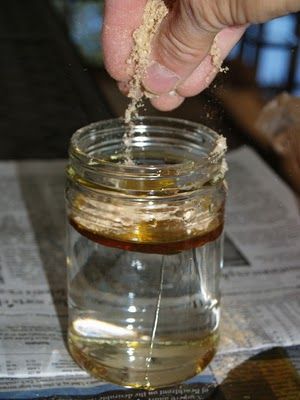
Oil and sea water don't mix. But it's still hard to get the oil out. Here Doug Stowe is adding some sawdust to a mixture of sea water and chainsaw oil.
Doug Stowe is perhaps best known as a box-maker and frequent contributor to Fine Woodworking. He recently submitted a tip to the Methods of Work department explaining that sawdust does a great job of removing oil finishes from your hands. That got him to thinking that maybe, just maybe, sawdust would remove oil spilt in water, like the spill currently reeking havoc in the Gulf of Mexico. Well, he has done some experimentation to test his theory and it seems promising to me. Of course, he is conducting very small tests and he hasn’t used crude oil in his tests yet, but I sure hope he gets a chance. I’d be more than happy to donate all of my sawdust (and all the dust we make here at FWW) to help clean up that mess in the gulf. Here are some links to Doug’s posts about his tests: Part 1, Part 2, and Part 3.
On a personal note, I’ll say that I am greatly saddened every time I see footage of what is taking place. I was born and raised in Florida, and the Gulf is a majestic place, and the coast along it is wonderful (I tend to block out the fact that certain cities in the Fla. panhandle seem to be the main source of some of the worst touristy crap I’ve ever seen, all of it air-brushed.) And I love heading out with my brother to do some offshore fishing. I wonder how soon I’ll get to do it again.
It seems as though there have been a heck of a lot of folks out there offering a wide variety of suggestions concerning this tragedy. So what are your thoughts on the spill? Any hair-brained or homegrown ideas out there? Be sure to post your thoughts in the comments section below.

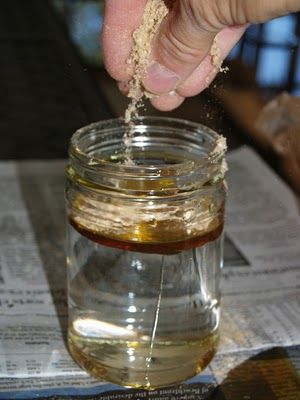
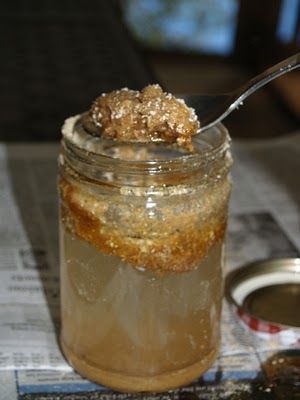
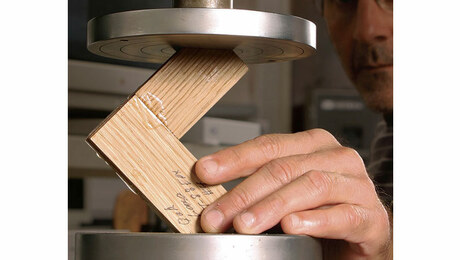





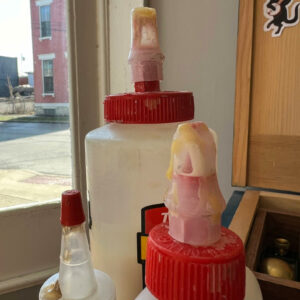

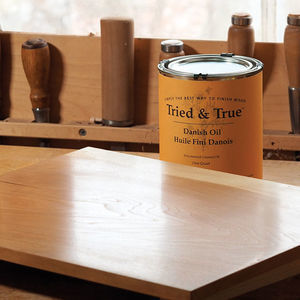
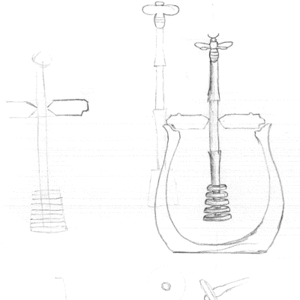












Comments
This sounds like the brilliant "hair booms" idea. (see http://www.miamiherald.com/2010/06/09/1672436_p2/bp-weighing-hundreds-of-oil-options.html for more.)
The stuff that's spewing out of the well isn't "oil" in the ordinary sense of the word. It has the consistency of the Cosmoline that's used to prevent steel from rusting while in storage (and it's about as difficult to remove--see http://www.google.com/hostednews/ap/article/ALeqM5gqLO-UjoQLFOS-5CaTDScSUnB46wD9G7SOF02 for a first-hand account). If you spread sawdust on it, the sawdust will certainly absorb the oil...over the course of a few years or more.
Why do people so often put forth "solutions" without bothering to understand the actual problem?
-Steve
Steve,
I would guess that Doug believes actually trying something out to see if it works or not is better than assuming it won't. No matter how improbable a solution might be, you'll never know if it will work until you try. And Doug is actually trying to understand the problem (I gathered that much from reading all of his posts and his response to comments). Also, even if he is way off base about this, he might stumble upon something else that is tremendously valuable. I won't knock him for trying. There are many far less productive things he could be doing.
"No matter how improbable a solution might be, you'll never know if it will work until you try."
Aside from being hopelessly naïve, that's also demonstrably false. Unless you make some effort to understand the problem you're trying to solve, you're just flailing around in the dark. (It's why the US Patent Office still receives a steady stream of applications concerning perpetual motion machines.)
Case in point: BP has received countless proposals for pushing/dumping/dropping items into the wellhead in order to plug the leak. With only a handful of exceptions, none of those proposals have taken into account the fact that the oil is spewing out at a pressure of around 20,000 psi (meaning, of course, that nearly anything you try to put inside the pipe is going to come right back out).
Quick: How much oil will a pound of sawdust absorb? How many pounds of sawdust are generated each day in the US? How quickly can you get that sawdust down to the Gulf coast? If you haven't done at least some back-of-the-envelope calculations to see if any of those numbers are even remotely in the ballpark of where they need to be, fooling around with jars of seawater is pointless. In a way, it's like cleaning oiled seabirds: It might make you feel better, but the birds are almost certainly going to die anyway.
If you REALLY want to do something to help out, volunteer to do coastal clean-up. If you can't do that, send money to the groups that are organizing those who can. For example: http://www.nature.org/multimedia/features/art31637.html
For the long term, take efforts to reduce your energy footprint (the less oil we need to extract, the smaller the chances of a spill). And write your elected representatives to ensure that this kind of thing can't happen again. (Yes, it means that oil would be more expensive. Deal with it--it's about time that we paid the true costs for the energy that we consume.)
-Steve
Steve, it is easy to knock other people's ideas, and a bit harder to come up with your own. I've admitted that the problems facing the gulf are complex, and haven't proposed sawdust as a one shot cure-all, but only as a possible untested resource. I would suggest that instead of knocking things, you do some tests of your own. The sawdust actually absorbs the oil quite rapidly.
Best would have been for BP to have taken its responsibilities to the environment and the lives of its workers more seriously.
Then we wouldn't have to be thinking about all this.
And personally, I think it is better under the circumstances to be thinking about it and testing things within the limits of our abilities, than to be idly knocking the effort of those who do.
Your question, "Why do people so often put forth 'solutions' without bothering to understand the problems?" Maybe because we care about how things turn out. And maybe we don't know as much as "experts" but you can see where the "experts" got us. The experts working for BP were the ones proposing "junk shots" and a variety of other untested means to stop the spill. My proposal is rather modest in comparison, because it would allow common people like myself to remove oil from water with a shovel.
Great spirits have always encountered violent opposition from mediocre minds.
- Albert Einstein
Please carry on Doug.
This spill in the gulf is absolutely tragic, and I love to see individuals attempting to propose ideas to solve it. I would however argue that the experts at BP had a much higher probability of success with a junk shot (which has worked previously) than throwing saw dust at the problem (which I have no doubt was proposed). While saw dust might have great success absorbing a highly refined petroleum product such as chainsaw oil, this test fails to do anything but scratch the surface. As Steve pointed out, a back of the envelop calculation should be used to see if such an effort would even be feasible before bashing what BP has been doing and suggesting that you have a better solution.
Please, continue to bring new ideas forth for a solution to the problem, but do not bash the BP team's efforts after conducting a limited garage project.
I follow Doug's blog and caught this when he first posted it. It strikes me as armchair quarterbacking... A glass on a kitchen table, a bucket, or a child's backyard pool do nothing to approximate the size of the gulf and the particular complexities. Chainsaw oil, gasoline, and motor oil are nothing like raw crude. Doug, despite being a very talented and smart guy, isn't an environmental or petroleum engineer.
The real though I've had is why Doug thinks it's a good idea to dump a large quantity of sawdust into the gulf? Sawdust doesn't belong there any more than oil.
I'll agree that sawdust doesn't belong there either. And the idea isn't to dump sawdust in the gulf, but to use it as a relatively simple and safe means to remove the oil. The current BP method involves well in excess of a million gallons of dispersant, which is strongly suspected of being toxic. The dispersant is supposed to reduce the oil droplets to a size capable of being consumed by bacteria, which sounds like a good thing until we are reminded of biochemical oxygen demand (BOD). The consumption of oil by bacteria strips the water of available oxygen with the probability of massive fish kills.
@Doug,
I have been involved in environmental activism for twenty-five years. I've served on boards of local and state organizations, I've spoken up at town halls, I've worked to provide elementary school teachers with materials so that they can include environmental education programs in their curricula, I've helped draft legislation to protect wetlands. Over those twenty-five years, I've donated thousands of hours, and tens of thousands of dollars, to efforts to try to prevent these kinds of disasters from happening in the first place.
So no, I'm not "idly" doing anything. I'm in this for the long haul. It sickens me to think about what's going on right now in the Gulf. But it sickens me far more to know that a few years from now, many of those same voices who are currently crying, "Off with their heads!" will be screaming that the cost of gasoline is too high.
It's not a lack of technological expertise that has created this disaster. Whether it's a blowout a mile deep in the Gulf, a lethal explosion in a coal mine in West Virginia, or even the meltdown of the financial system, the root causes are purely political and economic, not technical. They're all the result of inadequate risk assessment, and most importantly, inadequate (and sometimes nonexistent) risk mitigation.
The enormity of the devastation in the Gulf should--but probably won't--teach us that shortsightedness is what gets us into these messes, and the only practical way to deal with catastrophes of this magnitude is to prevent them from happening in the first place.
-Steve
Steve, I have also been involved in clean water and environmental issues since 1976 when I was a co-founder of a small organization called, "the National Water Center" and was chairman of our local Citizen's Advisory Committee for water and sewer renovation for the protection of our springs. I'm no a johnny-come-lately to the issues, and like you will be here for the long term.
What happened in the gulf sickens us all. We need to learn ways to keep it from happening again. Jimmy Carter warned when he was president that we should pay heed to environmental concerns and wean ourselves from dependency on oil. I still hope we can do so.
My simple experiment was just a thing to explore as a follow up, the ability of sawdust to capture oil. It was inspired by my discovery of using sawdust to clean hands, and my seeing so many oily hands of workers involved in the clean up. My experiment may come to naught. But, even if sawdust only served those involved the clean up by getting their hands clean and clear of the crap at the end of the day, it would be useful. As one more tool in the arsenal of clean-up techniques, I believe it deserves consideration. Thanks for sharing your thoughts.
The best thing we can ALL do is leave BP alone, allow them to stop the leak and get the spill cleaned up. Pointing fingers and pushing for retribution, however satisfying or appropriate that might be, DOES NOT SOLVE THE PROBLEM.
Based on my experience with oil spills, including the Exxon Valdez, within 3 or 4 years you'll never know it happened. A large majority of the damage in Price William Sound was from the actual cleanup effort. Nature has been dealing with Crude Oil for longer than we have been using
I just viewed on a news program that the oil still exists in Prince William Sound on the beach. It's been 20plus years since the Exxon Valdez incident. So the impact to the Gulf is going to last for a while. I am a geologist and the leaking wellhead in the Gulf is more about dollars than the ability to stop the flow of oil. A precise placed explosive device could seal the leaking oil by closing the shaft. BP is now trying to salvage their investment in the drilling operation and the environmental concern is secondary. The Government needs to step up and take control of the situation.
"A precise placed explosive device" could also leave a large crater with oil leaking our of the bottom of it, and no reasonable way to collect it. Best leave the engineering to the engineers.
BP will have to abandon the well regardless of which option they choose to stop the flow. There is no investment to be salvaged. Actually their investment is currently leaking into the gulf...
Anyone have a horse I can beat?
Hi Matt,
There is actually an EPA sitee where you can make suggestions:
https://iaspub.epa.gov/oilspill/surfacewaterhardware.do
Here was my 6/4 submission - based on our woodworking 'cyclonic dust collection systems':
"Describe the mechanical process that can be used to remove oil from seawater and/or fresh water."
We have Costner's huge centrifuges:
http://abcnews.go.com/Technology/kevin-costner-machine-bp-oil-clean/story?id=10689928
Now think Dunkirk - where thousands of little fishing boats and any tub that floated successfully evacuated over 100,000 stranded English soldiers.
Apply the same thinking with the centrifuge principle.
Commandeer every available commercial trash pump in the country. Fabricate 1000's of small scale centrifuges - using simple 55 gal or other tanks - with tangential inputs for the trash pumps - creating centrifigal flow - where the oil can be separated from the water. (This principle is used in commercial woodworking 'dust collection' all the time.)
As the oil is separated - burn it.
Comandeer every floating tub in the region to deploy the centifuges - in a continuous unbroken line (like trench warfare) - to stop the landfall of the spill.
Put the Army/National Guard callup to execute it.
"Principle of Operation"
Centrifugal removal of oil - using 1000's if not 10,000's of commercial trash pump based crude small-scale centrifuges"
Not surprisingly, I never heard anything..:>)
Chris
Matt,
RE: Earlier Post - Trash Pump Centrifuges
Even crazier might be to modify ordinary washing machines 'spin cycle' to provide the centrifugal action for separation.
There are of course millions of washing machines.
Lock the machines on 'spin' - modify the input/output flow. Perhaps even combine with a trash pump feed.
The machines burn-up in a few hours? They go back for rebuild..
Chris
I had sent my sawdust suggestion to a website sponsored by BP that was to take suggestions, and I got a response that it wasn't practical at this time. I had also sent it to Bill Nye, the Science Guy, and to a friend who is working on President Obama's commission on the oil spill. The guy on the commission is a woodworker and I haven't heard back from him yet. Bill Nye gave no response, but then he would be a busy guy.
Maslow said that if the only tool you have is a hammer, every problem looks like a nail. We have narrowed our range of tools and our range of perceivable solutions by failing to offer woodworking and other skills in American education.
But even if sawdust didn't end up part of the oil spill solution, it will get the crap off your hands.
By the way, I do like the washing machine idea. That sounds like something I could do myself. I doubt that it will get any of the BP engineers agitated, however. They will be looking at their range of suppliers for more expensive solutions. DIYers need not apply.
cahudson42: Oddly enough, Kevin Costner beat you tot he punch - ha ha ha. Check this out:
http://localtechwire.com/business/local_tech_wire/news/blogpost/7822012/
I was aware that Costner had 'huge' centrifuges - but not the details, except not many of them. 32. From the article epirnik referenced, it seems Costner's machines can each process approximately 10,000 GPH (if I did the math right)
A 250$ Trash Pump (ex: http://www.amazon.com/DuroMax-XP650WP-7-Horsepower-220-Gallon-Per-Minute-Gas-Powered/dp/B001BM67Y4/ref=sr_1_2?ie=UTF8&s=hi&qid=1277149170&sr=8-2) does 200 GPM, or roughly 12,000 GPH. I have no idea how much 'thruput' a single washing machine might provide - lets guess 1000 GPH.
So perhaps a bank of 12 washing machines @ $250/ea = $3,000.
Trash Pump $250. Add fabrication, generator(s) for the washing machines - and maybe you have what? $10,000 for each bank?
More importantly, the components are mostly already manufactured. And available by the 1000's if not 10,000's.
More of Costner's purpose built machines, which I sure hope work, will have an unfortunate manufacturing lead time to get more of them..
And what does a Costner machine cost? (though this should be seen as the least of any problem) $1M?
Meaning we might get 100 trash pump/washing machine systems for the same money - and 100x the cleaning thruput.
But as Doug (indirectly) observed, the 'this is not really a crisis' BP (and Obama unfortunately) mindset, means it would never get even a passing thought by these (non?) 'decision-makers'
BP is already using materials that absorb oil what do you think a boom does.
Problem is the huge amount of oil the booms quickly become completely soaked and ineffective. first off how would you contain the saw dust to the area you want. probably the same way the booms absorbent material is contained.
remember in addition to there being thousands of gallons of crude oil it is spilling into the Gulf not a little cup of water you have millions of gallons of sea water and not all the oil is floating on top.
To see just how impractical your idea is dump one cup of crude oil in a 15,000 gallon swimming pool then attempt to clean it out with saw dust.
then clean out all the saw dust all while someone makes waves in the pool and continually mixes up the oil and saw dust. you will have oil all over the sides of the pool long before you absorb the oil and the sides of the pool are the shore and you will have oil residue in your pool for a long time.
I am not a expert ether but I can tell you that BP knew a leak like this would be a huge problem to deal with the sin fact there really is no cure that gets all the oil. The Exxon Valdez incident was nothing compared the the amount of oil that is spilling in the gulf. And contrary to what JimmyD. writes all the oil in Price William Sound was not cleaned up and you only need stick your hand in the beach sand and you pull up oil and the toxins in oil remain even after the oil on the surface is gone.
THis is a huge problem with no simple solutions
I think it is great people are coming up with ideas, practical or not, high-tech or low. It is really a shame that we let the industry get away with not doing anything to improve either drilling safety (the last resort shear rams work about 45% of the time!) or cleanup. The cleanup technology has not changed since Valdez, and by the way, the booms are for containment only, not absorbing the oil.
How about while people are coming up with ideas, testing and implementing, we think about:
-Insisting that the industry contribute a certain amount to research on safety and cleanup research?
-Finding a way to ensure that government agencies (MMS, SEC, etc) HAVE TO do their jobs?
-Looking around to see which countries have the best drilling regulations, the best record, and learn from them?
-Finally getting our asses in gear and doing something about what energy hogs we are, and start serious investment in alternative energy.
Oh dear, here I go, chiming in. First, let me say some great comments whether technically based or not. The quote from Einstein says it all. The guy looking for a horse, well ... Steve seems a little upset, and I will come back to that. Second, some creds. I am a chemist/engineer. I've been consulting on the environment for over 40 years. I've advised large firms like Squibb, the steel companies, the Divisions of Allied Chem, etc. and small companies. I was working in hazardous waste before RCRA, TOSCA, CWA, CAA, and so on. I grew up in Buffalo, one of the great industrial centers back in the day because of its status as the 2nd largest rail center in the US and the ready availability of cheap hydro from Niagara Falls. I saw industry boom, and I have seen it bust, and been on the sites to clean it up after the bust. A lot of the success of my firm was based on our perspective to problems. We developed a knack for finding innovative alternative solutions, usually by questioning "common" knowledge. My first career (yeah, I had another one) in neurophysiology research blended with my second and the cross fertilization between the two allowed approaches the "experts" didn't grasp, denigrated, ridiculed (at first), etc.
I agree the underlying problem here is not technical. We do need to change our energy use. This is not new news, but it still is hard for some to accept. I also cringe at the thought of what is happening to the Gulf. I have worked with several environmental organizations over the years serving at the local, state and national level. I am committed to conservation. Sometimes when you are very close to the problems, perspective is lost. It is very frustrating Steve when some people fail to recognize the real problem, fail to understand logical consequences, fail to take responsibility for their life decisions. But for those who can, the task is to have renewed commitment. The person that doesn't get it is perhaps one step away from that epiphany moment when it all clicks into place, and you may be the vehicle.
Doug, I don't care if sawdust never works, I love the idea, and thank you for thinking it. As you say, it may not fuel a moon shot, but it may clean up the crap on the garage floor. (Why back in the day was there always sawdust on the floor in the butcher shop, and I apologize to all the kids who never saw meat that wasn't shrink wrapped.) And the wash machines! Fantastic. The problem we face here is a national mind set issue. As a community organizer, I work to create a hundred 5-person companies. The politicians aren't interested, because they want a 500 person company - now there's a photo op! But 100 companies are much more resilient to economic fluctuations, and are not a target for a global acquisition. We still struggle with the myth that bigger is better, and small scale workable solutions multiplied exponentially at reasonable unit costs unfortunately are NOT perceived as AN answer. Maybe our decision makers need a class in fractals and chaos theory. I'll shut up now.
MFournier: Unless I'm mistaken, oil booms don't absorb oil, they simply corral a slick and keep it as one "unit," as opposed to breaking apart and going all over the place. It's simply a final "rope" (rope is not the perfect analogy but my brain's not all fired up right now - still early).
There has been a lot of talk about centrifuges here but in my mind, there's simply too much of the stuff for that to be a viable option. This is like an entire lake of oil.
Sigh.
Cheers,
-Ed
@Rocketj - Fascinating perspective, not just on topic but in general. Would you mind dropping me a line at personal email tdruth at gmail.com? Would love to hear more about these small business coalitions and the thinking behind them. (Sorry for off-topic comment).
T. D.
Someone noted that Jimmy Carter had pointed out that we need to decrease our dependency on foreign oil and look for alternatives. He's not the only one to have espoused this novel idea.
For an interesting view of past presidents' claims, promises, mandates, and ultimately hollow words, check out Jon Stewart's piece at: http://www.thedailyshow.com/watch/wed-june-16-2010/an-energy-independent-future
Someone else pointed out that it's all about money now. It seems to me that money is a much greater motivator to clean up the spill than anything else; think of the dollar value (to BP) of the hundreds of thousands or millions of barrels of oil in the water. I would think it's in BP's best (financial) interest to gather up every drop of it, but suspect that the government noise (and subsequent needless damage to BP's marked capitalization), the media circus, and the tendency to put blaming above all else, is keeping that from happening very effectively.
If we want to think outside of the box, maybe the government and BP should sponsor a plan to let independent people with boats gather up the crude on their own, and deliver it to a central repository with a fair value bounty - it could be just like the Gold Rush of 1849! Of course the biggest issue there would be safety, and the red tape involved would probably be insurmountable.
But back to the original post, there have got to be better ways to skin this cat than having the government lambast BP. Creative solutions should abound - this is America, after all...
Why do people so often blow off an idea from someone who is not an expert? Bugs bunny came up with a great idea to raise a boat from the bottom of an ocean floor. Well the writer did anyway. Myself I always question expers and authority. Too many times politics dictates the action and generally in a way that makes the most money for some coorporation.
Things need to be done now. I don't know what the solution would be and I doubt throwing sawdust on it will work but that's how this country works. A million people give a million different ideas and usually one will work. I for one am not going to go back to college to study the physical propereties of liquids and fossil fuel. I don't have the time. Nor do most of the people on here,I'm guessing. But most appear to be pretty intelligent so I would welcome their ideas. Who invented pliers? Was it an engineer that spent years getting an education, i doubt it. I'm betting it was some working class guy who got tired of using his fingers. I really don't know though, could have been an engineer. Point being an awful lot of things get done by people who just use the tools and don't understand the physics and what other principles behind it.
Don't know if anyone has thought of this but in my experience you can remove the water from the oil. Meaning pump the oil off the surface into a tanker then remove the saltwater from the oil. Who needs a centafuge? The water will settle underneith the oil. Will still need a huge amount of tankers but hey its a thought.
I love when people try to come up with low tech ideas to fix things. Obviously crude oil is much different from refined chainsaw oil but I appreciate when people think outside the box. And who knows, you might stumble on a simple and elegant solution when the "all knowing" scientists consistently have failed. Ingenuity, what our world has thrived on for centuries.
NPR did a piece just yesterday on historic oil spill disasters and how they were handled. One off the Santa Barbara coast of California in 1969 was cleaned up by spreading hay on the water to absorb the oil with thousands of volunteers using pitchforks to load it onto to trucks to be hauled away. I think you're on to something but the magnitude of the current situation sure is humbling.
@Solnishko: You left out one important point: The cleanup attempts in Santa Barbara basically didn't work. Like in Alaska, they removed the visible, surface oil, but didn't do anything for the oil that had already been absorbed into the sand. It took years for fishery stocks to recover, and some shellfish populations still haven't.
I especially like a quote from the president of Union Oil at the time, "I don't like to call it a disaster, because there has been no loss of human life...I am amazed at the publicity for the loss of a few birds."
Sound disturbingly familiar?
Regarding the magnitude of the current spill, the TOTAL amount of oil released during the Santa Barbara spill is about equal to TWO DAYS worth of Deep Horizon leakage...
-Steve
I don't know how well the sawdust would absorb crude oil Steve. But Doug is on the right track.
Even if the crap doesn't absorb completely into the sawdust, it will stick to wood. Instead of sawdust, maybe they can use woodchips which will float better,throw it onto the oil in the water then use nets to drag it together. Then find a method to either pick the mixture up or burn it away from the shores. I think there are a lot of workable solutions out there. The problem is they don't want to lose the oil. They could'nt care less about the enviroment and the animal life. It's the millions or billions of dollars that is in their eyes. So when it comes to solutions for a true cleanup, the bigwigs won't even consider them unless it involves saving their precious oil. That's the truth of the matter. As for oil prices, That's just another big government scam. Probably 80% or more of gasoline cost is taxes anyway. Just like cigarettes. Just another way for the government to take more of our paychecks from us. Anyway enough said.
haha! I have no idea what kind of storage unit you're going to have to raid in order to get that much sawdust to clean up the gulf oil spill.But it does seem like a good idea, eco-friendly too!
Log in or create an account to post a comment.
Sign up Log in